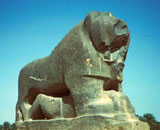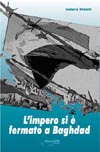MECHANICSBURG, Pa. - It was no surprise that President Bush, lacking smoking-gun evidence of Iraq's weapons programs, used his State of the Union address to re-emphasize the moral case for an invasion: "The dictator who is assembling the world's most dangerous weapons has already used them on whole villages, leaving thousands of his own citizens dead, blind or disfigured."
The accusation that Iraq has used chemical weapons against its citizens is a familiar part of the debate. The piece of hard evidence most frequently brought up concerns the gassing of Iraqi Kurds at the town of Halabja in March 1988, near the end of the eight-year Iran-Iraq war. President Bush himself has cited Iraq's "gassing its own people," specifically at Halabja, as a reason to topple Saddam Hussein.
But the truth is, all we know for certain is that Kurds were bombarded with poison gas that day at Halabja. We cannot say with any certainty that Iraqi chemical weapons killed the Kurds. This is not the only distortion in the Halabja story.
I am in a position to know because, as the Central Intelligence Agency's senior political analyst on Iraq during the Iran-Iraq war, and as a professor at the Army War College from 1988 to 2000, I was privy to much of the classified material that flowed through Washington having to do with the Persian Gulf. In addition, I headed a 1991 Army investigation into how the Iraqis would fight a war against the United States; the classified version of the report went into great detail on the Halabja affair.
This much about the gassing at Halabja we undoubtedly know: it came about in the course of a battle between Iraqis and Iranians. Iraq used chemical weapons to try to kill Iranians who had seized the town, which is in northern Iraq not far from the Iranian border. The Kurdish civilians who died had the misfortune to be caught up in that exchange. But they were not Iraq's main target.
And the story gets murkier: immediately after the battle the United States Defense Intelligence Agency investigated and produced a classified report, which it circulated within the intelligence community on a need-to-know basis. That study asserted that it was Iranian gas that killed the Kurds, not Iraqi gas.
The agency did find that each side used gas against the other in the battle around Halabja. The condition of the dead Kurds' bodies, however, indicated they had been killed with a blood agent - that is, a cyanide-based gas - which Iran was known to use. The Iraqis, who are thought to have used mustard gas in the battle, are not known to have possessed blood agents at the time.
These facts have long been in the public domain but, extraordinarily, as often as the Halabja affair is cited, they are rarely mentioned. A much-discussed article in The New Yorker last March did not make reference to the Defense Intelligence Agency report or consider that Iranian gas might have killed the Kurds. On the rare occasions the report is brought up, there is usually speculation, with no proof, that it was skewed out of American political favoritism toward Iraq in its war against Iran.
I am not trying to rehabilitate the character of Saddam Hussein. He has much to answer for in the area of human rights abuses. But accusing him of gassing his own people at Halabja as an act of genocide is not correct, because as far as the information we have goes, all of the cases where gas was used involved battles. These were tragedies of war. There may be justifications for invading Iraq, but Halabja is not one of them.
In fact, those who really feel that the disaster at Halabja has bearing on today might want to consider a different question: Why was Iran so keen on taking the town? A closer look may shed light on America's impetus to invade Iraq.
We are constantly reminded that Iraq has perhaps the world's largest reserves of oil. But in a regional and perhaps even geopolitical sense, it may be more important that Iraq has the most extensive river system in the Middle East. In addition to the Tigris and Euphrates, there are the Greater Zab and Lesser Zab rivers in the north of the country. Iraq was covered with irrigation works by the sixth century A.D., and was a granary for the region.
Before the Persian Gulf war, Iraq had built an impressive system of dams and river control projects, the largest being the Darbandikhan dam in the Kurdish area. And it was this dam the Iranians were aiming to take control of when they seized Halabja. In the 1990's there was much discussion over the construction of a so-called Peace Pipeline that would bring the waters of the Tigris and Euphrates south to the parched Gulf states and, by extension, Israel. No progress has been made on this, largely because of Iraqi intransigence. With Iraq in American hands, of course, all that could change.
Thus America could alter the destiny of the Middle East in a way that probably could not be challenged for decades - not solely by controlling Iraq's oil, but by controlling its water. Even if America didn't occupy the country, once Mr. Hussein's Baath Party is driven from power, many lucrative opportunities would open up for American companies.
All that is needed to get us into war is one clear reason for acting, one that would be generally persuasive. But efforts to link the Iraqis directly to Osama bin Laden have proved inconclusive. Assertions that Iraq threatens its neighbors have also failed to create much resolve; in its present debilitated condition - thanks to United Nations sanctions - Iraq's conventional forces threaten no one.
Perhaps the strongest argument left for taking us to war quickly is that Saddam Hussein has committed human rights atrocities against his people. And the most dramatic case are the accusations about Halabja.
Before we go to war over Halabja, the administration owes the American people the full facts. And if it has other examples of Saddam Hussein gassing Kurds, it must show that they were not pro-Iranian Kurdish guerrillas who died fighting alongside Iranian Revolutionary Guards. Until Washington gives us proof of Saddam Hussein's supposed atrocities, why are we picking on Iraq on human rights grounds, particularly when there are so many other repressive regimes Washington supports?
Stephen C. Pelletiere is author of "Iraq and the International Oil System: Why America Went to War in the Persian Gulf."
Published on Friday, January 31, 2003 by the New York Times
http://www.iraqwar.ru/iraq-read_article.php?articleId=32746&
lang=en
|
















